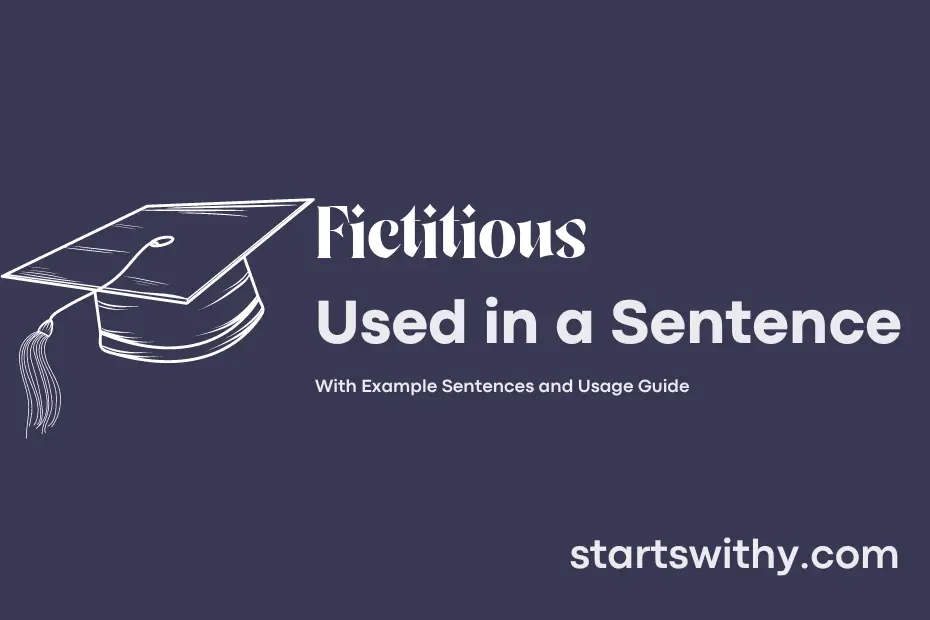Have you ever encountered a fictitious scenario that seemed so real it blurred the lines between reality and imagination? The word “fictitious” refers to something that is not real or true, existing only in the realms of creativity or fabrication.
In literature and entertainment, fictitious characters and stories often come to life, captivating audiences with their imaginative narratives. These creations serve as a medium for exploring the boundaries of what could be, pushing the limits of our beliefs and perceptions.
7 Examples Of Fictitious Used In a Sentence For Kids
- Rani told the class a *fictitious story about a magical unicorn.*
- The children used their imagination to create fictitious characters for their play.
- The teacher read a fictitious tale about talking animals to the students.
- The students giggled at the fictitious idea of a flying car in the story.
- The friends pretended to be superheroes with fictitious powers during recess.
- The little boy drew a colorful picture of a fictitious alien.
- The girls played dress-up with fictitious princess costumes.
14 Sentences with Fictitious Examples
- All the characters in the story were fictitious and created by the author’s imagination.
- The professor asked the students to analyze the fictitious world created in the novel they were studying.
- The college debate club staged a fictitious trial to explore ethical dilemmas in a hypothetical scenario.
- The creative writing course encouraged students to develop fictitious characters with complex backstories.
- The psychology students conducted a study on the impact of reading fictitious literature on cognitive development.
- The film studies class analyzed the use of fictitious elements in creating cinematic universes.
- The engineering students were tasked with designing a fictitious product for their capstone project.
- The sociology students discussed the portrayal of gender roles in fictitious societies in popular TV shows.
- The economics students debated the economic implications of a fictitious policy change in a hypothetical country.
- The history students examined the cultural representations of fictitious civilizations in ancient texts.
- The computer science students collaborated to develop a fictitious app as part of their software development course.
- The business students analyzed the marketing strategies used to promote a fictitious brand in a case study.
- The political science students simulated a fictitious election to understand the dynamics of campaign strategies.
- The law students debated the legal implications of a fictitious court case to sharpen their argumentation skills.
How To Use Fictitious in Sentences?
Fictitious
To use the word Fictitious in a sentence, you can follow these simple steps:
-
Understand the Meaning: The word “Fictitious” means not real or imaginary. It is used to describe something that is made up or fabricated.
-
Choose the Context: You can use the word in various contexts such as literature, storytelling, legal documents, or even in casual conversations.
-
Construct the Sentence: Start by identifying the subject and the action or description associated with it. For example, “The novel featured a fictitious character who could time travel.”
-
Grammar: Make sure the word Fictitious is placed correctly within the sentence. It can be used as an adjective to describe a noun.
-
Punctuation: Use proper punctuation marks such as commas and periods to ensure the sentence is clear and grammatically correct.
-
Practice: Try using the word Fictitious in different sentences to get comfortable with its usage. For example, “The movie’s plot was entirely fictitious and based on a fictional story.”
By following these steps and practicing regularly, you can effectively use the word Fictitious in a sentence with confidence.
Conclusion
In conclusion, fictitious sentences are imaginary or fabricated statements that are not based on reality. These sentences can be found in literature, storytelling, or creative writing, where they serve to entertain, inspire, or convey a message. When reading or writing fictitious sentences, it is important to distinguish between fact and fiction, and to appreciate the artistry and creativity behind such expressions.
Through the use of fictitious sentences, authors can explore different worlds, create diverse characters, and engage readers in compelling narratives. These sentences offer a means of escape, a way to provoke thought, and a platform for boundless imagination. Understanding and enjoying fictitious sentences can enrich our lives by opening up new possibilities and perspectives beyond the confines of reality.



